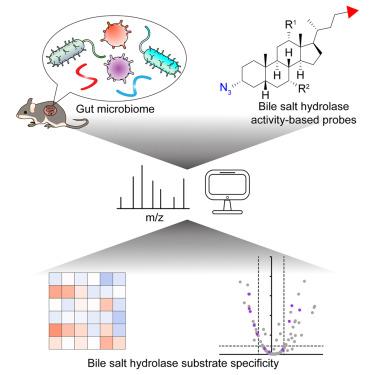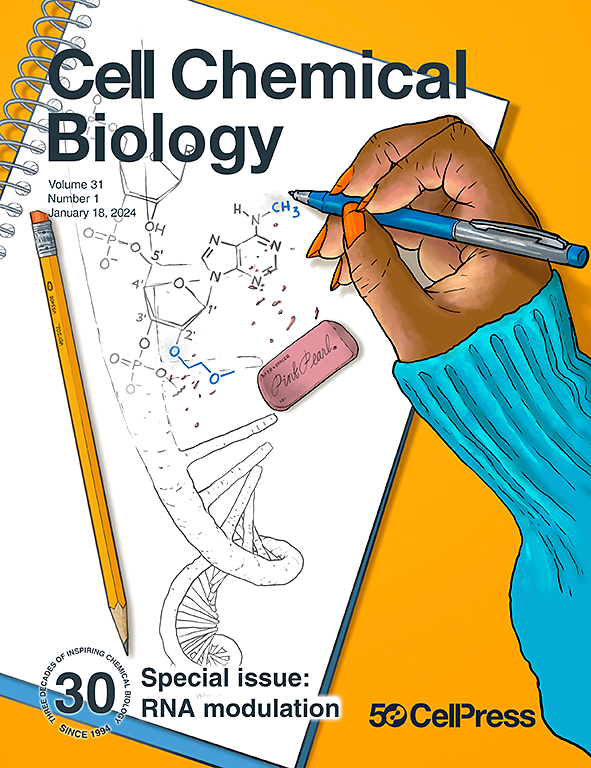肠道微生物相关胆盐水解酶底物特异性的化学蛋白质组学分析
IF 6.6
1区 生物学
Q1 BIOCHEMISTRY & MOLECULAR BIOLOGY
引用次数: 0
摘要
肠道微生物群拥有许多生化酶,它们能生物合成影响人类健康的代谢物。胆汁酸由多种代谢物组成,在新陈代谢和免疫中发挥着重要作用。胆盐水解酶(BSH)是肠道微生物相关酶,负责胆汁酸代谢过程中的门户反应,控制宿主的总体胆汁酸池。尽管这些酶起着关键作用,但由于肠道微生物群的复杂性(其元蛋白组包括种类繁多的蛋白质),对它们的活性和底物偏好进行剖析仍然具有挑战性。利用基于活性探针的系统生物化学方法,我们发现了表现出不同底物偏好的肠道微生物相关胆汁酸,揭示了不同微生物对宿主胆汁酸池多样性的贡献。我们设想这种化学蛋白组学方法将揭示由 BSHs 控制的次级胆汁酸代谢如何导致各种炎症性疾病的病因。本文章由计算机程序翻译,如有差异,请以英文原文为准。


Chemoproteomic profiling of substrate specificity in gut microbiota-associated bile salt hydrolases
The gut microbiome possesses numerous biochemical enzymes that biosynthesize metabolites that impact human health. Bile acids comprise a diverse collection of metabolites that have important roles in metabolism and immunity. The gut microbiota-associated enzyme that is responsible for the gateway reaction in bile acid metabolism is bile salt hydrolase (BSH), which controls the host’s overall bile acid pool. Despite the critical role of these enzymes, the ability to profile their activities and substrate preferences remains challenging due to the complexity of the gut microbiota, whose metaproteome includes an immense diversity of protein classes. Using a systems biochemistry approach employing activity-based probes, we have identified gut microbiota-associated BSHs that exhibit distinct substrate preferences, revealing that different microbes contribute to the diversity of the host bile acid pool. We envision that this chemoproteomic approach will reveal how secondary bile acid metabolism controlled by BSHs contributes to the etiology of various inflammatory diseases.
求助全文
通过发布文献求助,成功后即可免费获取论文全文。
去求助
来源期刊

Cell Chemical Biology
Biochemistry, Genetics and Molecular Biology-Molecular Medicine
CiteScore
14.70
自引率
2.30%
发文量
143
期刊介绍:
Cell Chemical Biology, a Cell Press journal established in 1994 as Chemistry & Biology, focuses on publishing crucial advances in chemical biology research with broad appeal to our diverse community, spanning basic scientists to clinicians. Pioneering investigations at the chemistry-biology interface, the journal fosters collaboration between these disciplines. We encourage submissions providing significant conceptual advancements of broad interest across chemical, biological, clinical, and related fields. Particularly sought are articles utilizing chemical tools to perturb, visualize, and measure biological systems, offering unique insights into molecular mechanisms, disease biology, and therapeutics.
 求助内容:
求助内容: 应助结果提醒方式:
应助结果提醒方式:


